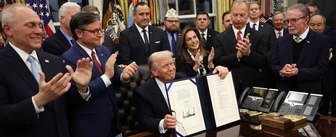Mixed messages about safety in schools have made many Americans wary of in-person K-12 classes this fall. In the latest Economist/YouGov Poll, a majority (58%) of the public prioritizes mostly online education over mostly in-person teaching, with the largest share saying education should be entirely online.
Republicans are most in favor of in-person classes (56%). Democrats (77%) and Independents (58%) want most education to be primarily online. Parents of children under the age of 18 prefer mostly online instruction (62%), though the party differences seen in the general population remain among parents. Democratic and Independent parents favor online education, while Republican parents (like Republicans overall) prefer mostly in-person teaching.
Americans mostly trust schoolteachers by two to one to keep children safe by self-quarantining if they have been exposed to the coronavirus, but they are less likely to trust parents to keep a child who has who may have been exposed (27% mostly trust parents on this while 41% mostly or totally do not).
There are only small party differences on the evaluation of teachers, but half of Democrats are dubious that parents can be trusted to keep sick children home if they have been exposed to the virus. Just 27 percent of Republicans say this. Parents of children under 18 are more doubtful than not. Fewer than half (45%) of parents mostly don’t trust other parents, 29 percent do.
But student behavior may be most concerning for Americans, as half the public (and nearly half of students’ parents) don’t trust students to maintain social distancing in school. Majorities of Democrats and Independents are distrustful, while Republicans are more closely divided.
There is little disagreement about how students and teachers who have been exposed to the virus should behave. They should stay home, even if they are asymptomatic (79%). Only one in five adults (21%) say those students and teachers should continue to go to school until they test positive or start to develop symptoms.
The Trump Administration recently declared teachers to be “critical infrastructure workers,” which would require them to work even if exposed to the coronavirus as long as they had no symptoms. Americans agree that teachers are “critical infrastructure workers,” and approve of declaring them such by two to one. Still, two-thirds of those who approve of this action believe any teacher exposed to the virus, symptomatic or not, needs to stop teaching and stay home for 14 days.
See the toplines and crosstabs from this week’s Economist/YouGov Poll
Methodology: The Economist survey was conducted by YouGov using a nationally representative sample of 1,500 U.S. adult citizens interviewed online between August 23 - 25, 2020. This sample was weighted according to gender, age, race, and education based on the American Community Survey, conducted by the US Bureau of the Census, as well as 2016 Presidential vote, registration status, geographic region, and news interest. Respondents were selected from YouGov’s opt-in panel to be representative of all US citizens. The margin of error is approximately 3.6% for the overall sample.
Image: Getty










